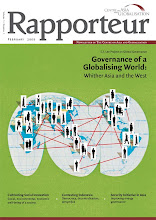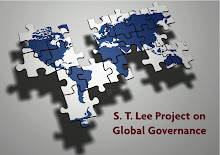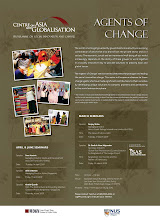 A week ago today I attended the Mahatma Gandhi-Daisaku Ikeda Peace Research Conference on “The Rise of China and India: Towards a Harmonious Region?” It was organized by NUS's East Asian Institute and held at the Hotel Parkroyal.
A week ago today I attended the Mahatma Gandhi-Daisaku Ikeda Peace Research Conference on “The Rise of China and India: Towards a Harmonious Region?” It was organized by NUS's East Asian Institute and held at the Hotel Parkroyal.Why do we attend conferences and workshops? Is it to learn something new? Is it to showcase our own work? Is it to network and make connections that may lead to future collaborations? In many cases it would be all of the above. But I am especially keen to learn something new and not just new facts and figures but new ideas and new ways of thinking.
Professor Shih Choon Fong, the President of NUS, wrote in the forward message of the conference programme; “How will these two Asian giants tackle the issues of good governance, development, eradication of poverty, education, scientific and technological innovation? Are they able to act as two powerful engines of growth and serve as anchors for the peace and prosperity of the East Asian community?
The objective of the conference was to explore opportunities and obstacles to a harmonious region underpinned by the rise of China and India. The conference provided a platform for scholars from China, India, Indonesia, Japan, Malaysia, Philippines, Singapore and Thailand to present their perspectives.
The presentations ranged from the theoretical to a widely improbable scenario. One speaker outlined how Western international relations theory can help in understand the rise of China. He looked at the effectiveness of the realist, institutionalist and constructivism approach to explaining the rise of China and argues that there is a deep gap between economics study and international relations study yet provides no alternative.
Then there is the professor who is pessimistic about harmony in the region, believing that China’s rise in economic, military and cultural power will create conflict – perhaps to the extent of a major conflict between the USA and China.
Another professor noted that Japan is concerned about the possibility that the rise of China and India may result in the relatively less important role of Japan in the world political and economic order. And Japan is worried about the USA changing its attitude towards the country.
As a participant with limited knowledge of China and India, I felt each perspective and presentation give me a better understanding of the past and present of these two countries. Indeed I learned new facts and figures. Yet I was looking for more. I imagined the conference would shed some light on what the institutional arrangements of a harmonious region would look like. I thought it could provide more insight to the questions posed by Professor Shih Choon Fong. [Sandra]










No comments:
Post a Comment